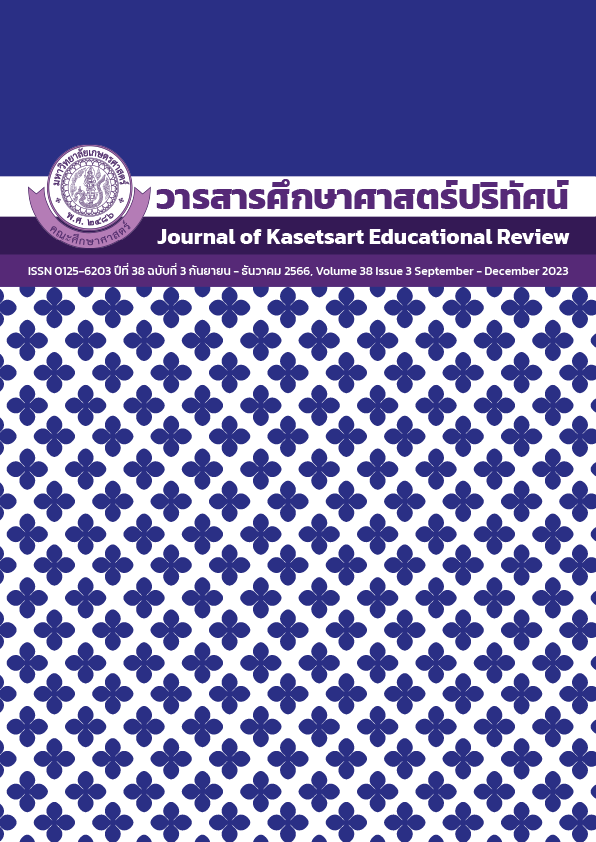การพัฒนาสรรถนะการแก้ปัญหาแบบร่วมมือของนักเรียนชั้นมัธยมศึกษาปีที่ 6 ในบทเรียนเรื่อง ลมฟ้าอากาศและภูมิอากาศ โดยการจัดการเรียนรู้ ตามทฤษฎีการสร้างความรู้ด้วยตนเองโดยการสร้างสรรค์ชิ้นงาน
คำสำคัญ:
สมรรถนะการแก้ปัญหาแบบร่วมมือ, ทฤษฎีการสร้างความรู้ด้วยตนเองโดยการสร้างสรรค์ชิ้นงาน, ลมฟ้าอากาศและภูมิอากาศบทคัดย่อ
งานวิจัยนี้มีจุดมุ่งหมายเพื่อพัฒนาสมรรถนะการแก้ปัญหาแบบร่วมมือของนักเรียนชั้นมัธยมศึกษาปีที่ 6 เรื่อง ลมฟ้าอากาศและภูมิอากาศ ด้วยการจัดการเรียนรู้ตามทฤษฎีการสร้างความรู้ด้วยตนเองโดยการสร้างสรรค์ชิ้นงาน ผู้เข้าร่วมวิจัย ได้แก่ นักเรียนชั้นมัธยมศึกษาปีที่ 6 จำนวน 29 คน เครื่องมือที่ใช้ในการวิจัย ได้แก่ แบบประเมินตนเองเกี่ยวกับสมรรถนะการแก้ปัญหาแบบร่วมมือของนักเรียนและแผนการจัดการเรียนรู้ตามทฤษฎีการสร้างความรู้ด้วยตนเองโดยการสร้างสรรค์ชิ้นงาน วิเคราะห์ข้อมูลโดยใช้การหาความถี่และค่าเฉลี่ย ผลการวิจัย พบว่า การจัด การเรียนรู้ตามทฤษฎีการสร้างองค์ความรู้ด้วยตนเองโดยการสร้างสรรค์ชิ้นงาน สามารถพัฒนาสมรรถนะการแก้ปัญหาแบบร่วมมือ ด้านที่ 3 การสร้างและรักษาระเบียบของกลุ่ม ได้มากที่สุด คือ 2.65 คะแนน รองลงมา คือ ด้านที่ 2 การเลือกวิธีการดำเนินการที่เหมาะสมในการแก้ปัญหา 2.61 คะแนน และด้านที่ 1 การสร้างและเก็บรักษาความเข้าใจที่มีร่วมกัน ได้คะแนนน้อยที่สุด คือ 2.55 คะแนน สำหรับแผนการจัดการเรียนรู้ที่ 3 มีคะแนนเฉลี่ยรวมสมรรถนะทุกด้านมากที่สุดคือ 2.85 รองลงมาเป็นแผนการจัดการเรียนรู้ที่ 1 คือ 2.54 และน้อยที่สุดคือ แผนการจัดการเรียนรู้ที่ 2 มีคะแนนเฉลี่ย 2.42 จากคะแนนเต็มทั้งหมด 3 คะแนน
เอกสารอ้างอิง
Andrews, T. (2012). What is Social Constructionism? The Grounded Theory Review, 11(1), 39-46.
Antonenko, P. P. (2014). Fostering collaborative problem solving and 21st century skills using the DEEPER scaffolding framework. Research and Teaching, 43(6), 78– 88.
Choomchua, H. & Chanunan, S. (2021). Eahancing 11th Grade Students' Collaborative Problem Solving Competency by Using Collaborative Problem-Based Learning Approach (Cpbl) with the use of Padlet Application on the Topic of Electrochemistry. Journal of Education Naresuan University, 23(3), 358-370. [in Thai]
Chaidech, T., Chanunan, S., & Chaiyasit, W. C. (2017). Development of collaborative problem solving competency using research-based learning according to STEM education in fossil fuels and products. Journal of Research Unit on Science, Technology and Environment for Learning, 8(1), 51-66. [in Thai]
Galbin, A. (2014). An introduction to social constructionism. The Grounded Theory Review, 26(6), 82-92.
Graesser, A. C., Fiore, S. M., Greiff, S., Andrews-Todd, J., Foltz, P. W., & Hesse, F. W. (2018). Advancing the Science of Collaborative Problem Solving. Psychological Science in the Public Interest, 19(2), 59–92.
Harel, I. and Papert, S. 1991. Constructionism. Ablex Publishing.
IPST. (2018). Collaborative problem solving: How to test PISA. Retrieved Jun 11, 2023, from https://pisathailand.ipst.ac.th/issue-2018-25/ [in Thai]
Jahanzad, F. (2012). The influence of the DEEPER scaffolding framework on problem solving performance and transfer of knowledge. Oklahoma: Oklahoma State University.
Kammanee, T. 2011. Art of Teaching: Body of Knowledge for Organizing Effective Learning Process. Chulalongkorn University Printing House. Bangkok. [in Thai]
Kemmis, S., & McTaggart, R. (1988). The Action Research Planner (3rd ed). Deakin University Press.
OECD. (2023). PISA 2015 Collaborative Problem Solving. Retrieved Jun 11, 2023, from https://www.oecd.org/pisa/innovation/collaborative-problem-solving/
Papert, S. 1993. Mindstorms: Children, Computers, And Powerful Ideas. New York: Harper Collins Publishers, Inc.
Pawang, S. 2020. The development of the competency in collaborative problem solving by using learning management through DEEPER scaffolding Framework of Mathayomsuksa 4 student. Thesis M.Ed in Teaching Science and Mathematics, Mahasarakham University. [in Thai]
Phasuk, P., Sawangmake, S., & Wattanachaiyingcharoen, W. (2017). An action research for enhancing collaborative problem solving competency of grade 10 students in topic “Digestive System” using learning management through DEEPER scaffolding framework. Social Sciences Research and Academic Journal, 12(34), 127-140. [in Thai]
Sukorn, S. & Chanunan, S. (2019). Enhancing the Collaborative Problem-Solving Competency of 12th Grade Students Based on STEM Education Through Problem-based Learning in the topic of Polymer. Journal of Education, 30(2), 166-181. [in Thai]
Tayom, C., Kijkuakul, S., & Klamtet, J. 2017. Action Research for Developing Collaborative Problem Solving Competency Using DEEPER Scaffolding Framework on Stoichiometry Topic for Enrichment Science Classroom, Mathayom Suksa IV Students. Academic Services Journal, Prince of Songkla University, 28(2), 34-45. [in Thai]
Techapalokul, C. 2019. Enhancing 10th Grade Student’s Collaborative Problem Solving Competency Using the Flipped Classroom Approach and Google Classroom with Case Study on Stoichiometry. Thesis M.Ed. in Science Education, Naresuan University. [in Thai]
Tunhikorn, B. 2009. Application of Information Technology in Teaching and Learning (2nd Ed). Bangkok: Office of the Basic Education Commission (OBEC). [in Thai]
ดาวน์โหลด
เผยแพร่แล้ว
ฉบับ
ประเภทบทความ
สัญญาอนุญาต
ลิขสิทธิ์ (c) 2024 วารสารศึกษาศาสตร์ปริทัศน์

อนุญาตภายใต้เงื่อนไข Creative Commons Attribution-NonCommercial-NoDerivatives 4.0 International License.
บทความทุกบทความเป็นลิขสิทธิ์ของวารสารคณะศึกษาศาสตร์ มหาวิทยาลัยเกษตรศาสตร์ วิทยาเขตบางเขน
วารสารศึกษาศาสตร์ปริทัศน์ (Kasetsart Educational Review)






